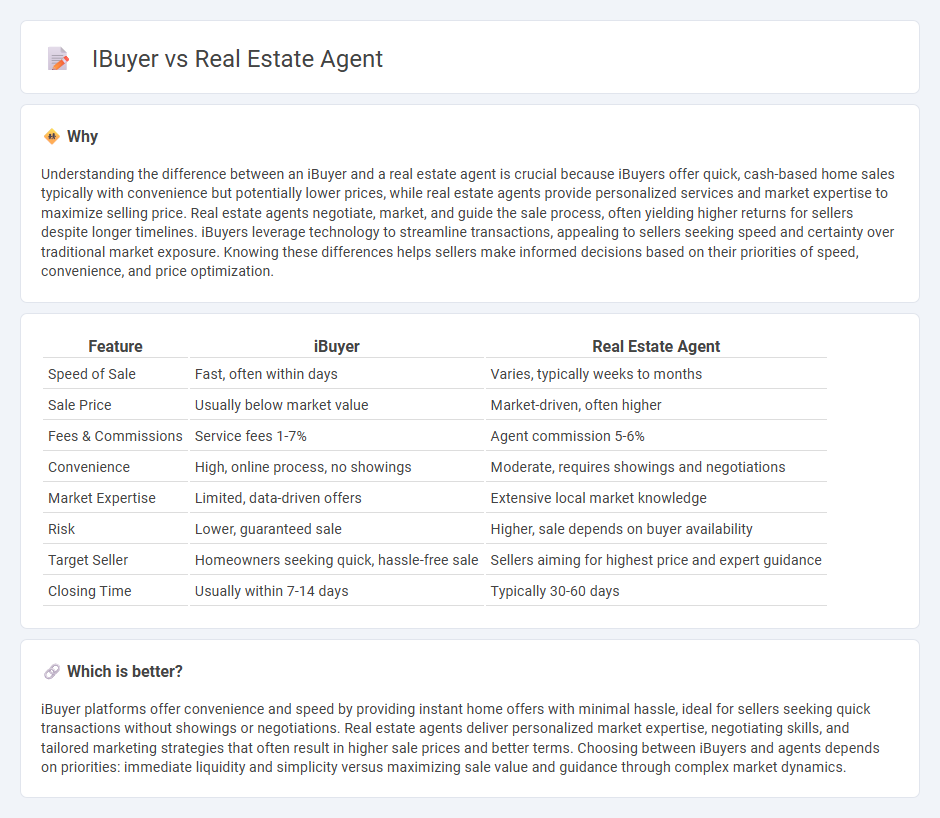
iBuyers offer a technology-driven approach to selling homes quickly by providing instant cash offers based on market data, bypassing traditional listing processes. Real estate agents bring personalized expertise, negotiation skills, and local market knowledge to maximize property value and guide clients through complex transactions. Discover the pros and cons of each option to determine the best fit for your home selling needs.
Why it is important
Understanding the difference between an iBuyer and a real estate agent is crucial because iBuyers offer quick, cash-based home sales typically with convenience but potentially lower prices, while real estate agents provide personalized services and market expertise to maximize selling price. Real estate agents negotiate, market, and guide the sale process, often yielding higher returns for sellers despite longer timelines. iBuyers leverage technology to streamline transactions, appealing to sellers seeking speed and certainty over traditional market exposure. Knowing these differences helps sellers make informed decisions based on their priorities of speed, convenience, and price optimization.
Comparison Table
| Feature | iBuyer | Real Estate Agent |
|---|---|---|
| Speed of Sale | Fast, often within days | Varies, typically weeks to months |
| Sale Price | Usually below market value | Market-driven, often higher |
| Fees & Commissions | Service fees 1-7% | Agent commission 5-6% |
| Convenience | High, online process, no showings | Moderate, requires showings and negotiations |
| Market Expertise | Limited, data-driven offers | Extensive local market knowledge |
| Risk | Lower, guaranteed sale | Higher, sale depends on buyer availability |
| Target Seller | Homeowners seeking quick, hassle-free sale | Sellers aiming for highest price and expert guidance |
| Closing Time | Usually within 7-14 days | Typically 30-60 days |
Which is better?
iBuyer platforms offer convenience and speed by providing instant home offers with minimal hassle, ideal for sellers seeking quick transactions without showings or negotiations. Real estate agents deliver personalized market expertise, negotiating skills, and tailored marketing strategies that often result in higher sale prices and better terms. Choosing between iBuyers and agents depends on priorities: immediate liquidity and simplicity versus maximizing sale value and guidance through complex market dynamics.
Connection
iBuyers leverage advanced algorithms and market data to offer quick property purchases, streamlining the selling process for homeowners. Real estate agents complement this by providing personalized market insights, negotiation skills, and localized expertise that iBuyers may overlook. Together, they create a hybrid model where technology enhances efficiency while agents ensure tailored, client-focused service in real estate transactions.
Key Terms
Commission
Real estate agents typically charge a commission of 5-6% of the home sale price, which covers marketing, negotiations, and personalized service. iBuyers offer convenience and speed by purchasing homes directly, often charging service fees between 1-4% but may result in lower sale prices due to instant offers. Discover how commission structures impact your net proceeds and selling experience by exploring detailed comparisons.
Instant Offer
Real estate agents provide personalized market analysis and negotiation skills, while iBuyers offer the convenience of an Instant Offer based on algorithm-driven pricing for a quick sale. The Instant Offer streamlines the process by reducing time on market and eliminating traditional contingencies, appealing to sellers seeking speed and certainty. Discover how Instant Offers compare to traditional agent listings to decide the best route for your property sale.
Market Valuation
Real estate agents provide personalized market valuations based on comprehensive local data, property features, and comparable sales, often resulting in a more accurate and competitive pricing strategy tailored to individual sellers. iBuyers use algorithm-driven models to offer near-instant market valuations, prioritizing convenience but sometimes overlooking nuanced market trends and property-specific details. Explore detailed comparisons to understand which approach maximizes your property's value.
Source and External Links
What is a real estate agent and what do they do? - Real estate agents are licensed professionals who organize and assist in property transactions, typically paid on commission, and can represent buyers, sellers, or both parties in a deal.
Real estate agent - Wikipedia - Real estate agents typically work under licensed brokers, represent buyers or sellers of real property, and are licensed by the state to negotiate sales and manage transaction documents.
How to Become a Real Estate Agent | KapRE.com - To become a licensed real estate agent, one must meet state age and residency requirements, complete pre-licensing education, and pass a state exam.
 dowidth.com
dowidth.com